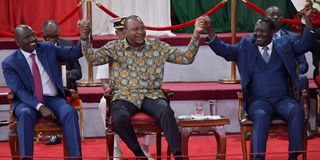The art of political romance

President Uhuru Kenyatta (centre), Deputy President William Ruto (left) and opposition leader and former Prime Minister Raila Odinga during the Building Bridges Initiative (BBI) report launch in Nairobi.
What you need to know:
- This time last year, the whole BBI thing looked dead on arrival.
- Its opponents were very vocal and dominated every corner of the conversation one turned to.
On Tuesday, the Constitution of Kenya (Amendment) Bill 2020 was passed by the Senate. The bill, more popularly known as the Building Bridges Initiative (BBI) Bill, now goes to President Uhuru Kenyatta, who is likely to quickly sign it, and then there will be a referendum — or rather a lot of drama — in the second half of the year.
What a rollercoaster ride BBI has had! This time last year, the whole BBI thing looked dead on arrival. Its opponents were very vocal and dominated every corner of the conversation one turned to. It was expected that the county assemblies would reject it, but in a few short days, the dominoes tumbled quickly, and a surprising 42 of them out of 47 passed the BBI. There was talk and accusations of members of County Assembly (MCAs) being intimidated or bribed, or them being double-faced, and traitors, but BBI sailed through.
Next up was the National Assembly. There, too, after some pushing and shoving, many of the BBI opponents “saw the light” and voted for it. Again, there was talk of intimidation, bribery, betrayal, opportunism and hypocrisy.
Heading for the Senate, it seemed even more uncertain, and the past two weeks saw a lot of forceful opposition to several of its provisions and an unusually high level of dissent in Raila Odinga’s Orange Democratic Movement (ODM) wing of the BBI consortium. On Tuesday, it swept through Senate with dozens of votes to spare.
On social media, the charges of opportunism and betrayal came thick and fast.
Something doesn’t up. It cannot be that nearly all politicians are double-faced, bribable and don’t mean what they say. It also can’t be that the public and their constituents are clueless, and that they don’t learn from past “betrayals” and keep expecting, as in the BBI case, that all its opponents would hold their guns.
The reality seems to be that it’s the public that has not cottoned on the fact that the positions politicians take are negotiating tactics, and all the drama of being for or against something is, in the end, little more than a courtship dance. Not all politicians are crooks.
When they say they oppose something, it often is nothing more than a negotiating strategy, and could be the same thing as a fake pass in basketball or rugby, or a back pass in football. You can’t accuse a rival player of being dishonest because you fell for his fake pass move.
Price for support
A politician who opposes or supports a controversial policy loudly could be doing nothing more than telling the Big Men at the top that he wants them to pay attention to him, signalling what his price for support will be, or how what he expects his reward to be when victory is won — an ambassadorship, ministership or appointment to a lucrative board.
It is no different than turning up at a party with hair dyed bright green and purple, an open-chest shirt with five kilogrammes of bling around your neck, or pulling up in an over-the-top car. All these people are shopping for attention, and/or seeking to stand out from the crowd.
A few years ago, Nollywood actress Beverly Osu outraged the godly when she shared a photo of herself in a Catholic nun’s dress while smoking. Also in Nigeria, socialite and celebrity stylist Toyin Lawani recently channelled Osu, dressing as a nun but with a prominent slit all to her waist and looking all sassy. The God-fearing were up in arms again. However, both were seeking to stand out, and they succeeded.
Nobody, even for a second, imagined Osu or Lawani were displaying their deep religiosity. However, when a politician from a president’s ruling party threatens to run the Big Man out of town and destroy him, we tend to believe them and invest our hope in them bringing the system down.
Too many of us fall for it, because we might dislike the president, and feeling helpless in being able to destroy him ourselves, are too quick to place our hopes in someone else, especially if he or she has more power than us. Or if you are a regime supporter and dislike the opposition, you are more likely to seize on petty procedural arguments in the camp as a sign of the beginning of the demise of, for example, Raila.
It’s us who have been played. The politicians are just being adept at their craft. There is an African proverb that cannot be used in a family newspaper but a polite version of it is, “It is a foolish bird that soils its own nest.” Most politicians aren’t foolish to soil their nest. Politics is what pays the rent and their children’s school fees.
BBI is, in the end, an extensive redistribution of the political spoils in Kenya. To expect that it would meet political death at the hands of MCAs, MPs or senators says more about the rest of us than it does about the politicians.
Mr Onyango-Obbo is a journalist, writer and curator of the Wall of Great Africans. @cobbo3





